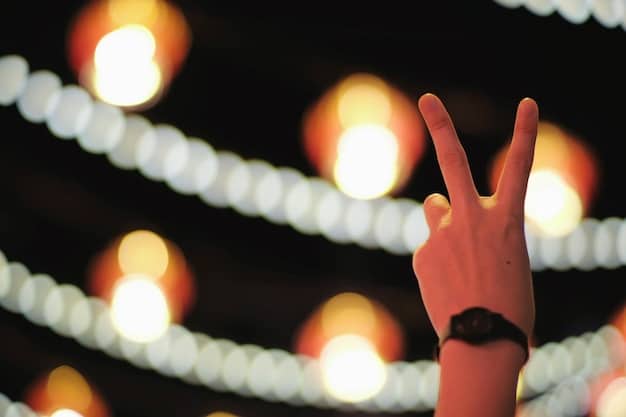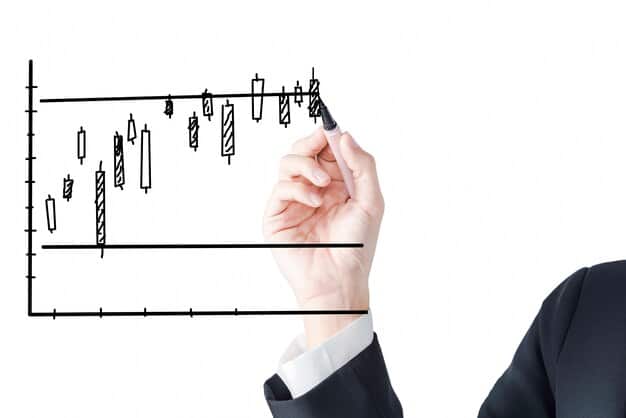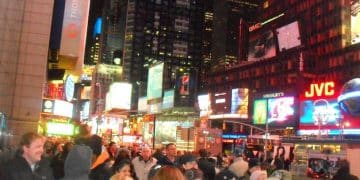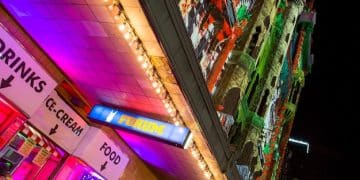Concert Ticket Prices Soaring: Insider Tips for Live Music Deals

Navigating the rising costs of live music tickets requires strategic planning and insider knowledge, including leveraging presales, understanding dynamic pricing, and exploring secondary markets carefully to secure deals on highly coveted events.
The exhilaration of live music is unparalleled, but for many enthusiasts, the dream of attending their favorite artist’s concert is increasingly overshadowed by escalating prices. In today’s market, Concert Ticket Prices Soaring: Insider Tips to Score Deals on Live Music Events has become a pressing concern for fans everywhere, making smart purchasing strategies more crucial than ever.
understanding the modern music ticketing landscape
The journey to securing concert tickets has evolved dramatically over the past decade. What was once a relatively straightforward transaction has become a complex ecosystem influenced by technology, demand, and various market players. Understanding this landscape is the foundation for anyone hoping to navigate the challenges of soaring prices and find genuine value.
The primary reason behind the surge in concert ticket prices lies in a combination of factors, each contributing to the overall cost burden placed on the consumer. These aren’t isolated incidents but rather systemic shifts within the entertainment industry. From the artists themselves to the venues and the platforms facilitating sales, every entity plays a role in defining the final price point for fans.
the rise of dynamic pricing
One of the most significant changes has been the widespread adoption of dynamic pricing. This model, familiar in industries like airlines and ride-sharing, adjusts ticket prices in real-time based on demand. For high-profile artists or highly anticipated events, this means prices can surge dramatically shortly after tickets go on sale, or even before, based on speculative demand.
- How it works: Algorithms analyze data points like historical sales, current interest, and even social media buzz to predict demand and adjust prices accordingly.
- Impact on fans: This often leads to a “rush to buy” mentality, where fans feel compelled to purchase tickets immediately, regardless of price, fearing further increases.
- Ethical considerations: Critics argue that dynamic pricing exploits fan loyalty, making live music inaccessible for many who cannot afford premium prices.
secondary markets and scalping
While often conflated with scalping, secondary markets like StubHub and SeatGeek serve a legitimate purpose by providing a platform for fans to resell tickets they can no longer use. However, they also become ground zero for professional scalpers who buy tickets in bulk to resell at inflated prices. This phenomenon is exacerbated by bots that can bypass purchasing limits and snap up tickets faster than human buyers.
The symbiotic, yet often contentious, relationship between primary vendors and secondary markets adds another layer of complexity. Some primary vendors have established partnerships or affiliations with resale platforms, blurring the lines between initial sale and aftermarket. This environment places increased pressure on fans, who are often left competing against automated systems and well-funded resale operations. The net effect is a significant upward push on prices, especially for in-demand shows.
Navigating this intricate system requires more than just luck; it demands strategy. Understanding the players, their motivations, and the mechanisms by which prices are determined empowers fans to make more informed decisions and potentially find opportunities to score better deals.
cracking the presale code
Presales are often the first, and sometimes best, opportunity to secure concert tickets before they become available to the general public. These exclusive windows are designed to reward loyal fans, credit card holders, or fan club members, offering a chance to bypass the initial rush and potentially secure tickets at face value. However, cracking the presale code isn’t always straightforward, as different types offer varying levels of access and require specific strategies.
Mastering presales involves being proactive and understanding the numerous pathways to early access. It’s a game of preparation and promptness, as these coveted early releases can still sell out rapidly. Knowing where to look for codes and how to sign up for various lists can make all the difference in bypassing the general sale scramble.
artist and fan club presales
Many artists offer dedicated presales to their most dedicated fans through their official fan clubs or mailing lists. Joining these allows fans early access codes, which are often sent directly to their inboxes. This is arguably the most direct route to face-value tickets, as it bypasses many of the external influences that drive up prices in later sales phases.
- Sign-up early: Join fan clubs and artist mailing lists well in advance of any tour announcements.
- Monitor communications: Keep an eye on emails and social media for presale code announcements.
- Act quickly: Presale windows are typically short, and tickets can still sell out fast, even with limited access.
credit card and sponsor presales
Credit card companies, particularly those like American Express or Citi, frequently partner with ticketing platforms and artists to offer exclusive presales to their card members. These presales often offer strong access to prime seats. Similarly, various sponsors or event partners may also have their own dedicated presale windows, requiring codes or specific links.
Accessing these often requires being a cardholder or a member of the sponsoring organization, providing another valuable avenue for early ticket acquisition. It’s advisable to check if your existing credit cards offer such benefits or if joining a particular program could grant you advantageous access to future events. These avenues are frequently underutilized by casual concertgoers and can present significant opportunities for diligent fans.
Successfully navigating presales requires vigilance and a willingness to sign up for multiple alerts and memberships. While it doesn’t guarantee a ticket, it significantly increases the odds of securing one at a more reasonable price and avoiding the intense competition of general public sales.

strategic buying on general sale days
Even if presales are missed, or for events without them, the general sale remains a primary battleground for concert tickets. This is when the widest public access occurs, often leading to fierce competition. Successfully navigating general sale days requires not just speed but also a strategic approach to maximize your chances of securing tickets, even when prices are subject to rapid change.
General sale days are notorious for being chaotic, with millions of fans simultaneously attempting to purchase a limited number of tickets. The key to success often lies in meticulous preparation and understanding the common pitfalls. Being ready the moment tickets drop can be the difference between getting a seat and missing out entirely.
preparation is key
Before the sale goes live, ensure your accounts with various ticketing platforms (Ticketmaster, Live Nation, etc.) are set up, updated, and logged in. Have your payment information saved and easily accessible. Multiple devices can also be beneficial, allowing you to try different access points or browsers simultaneously, though this may not always be officially supported.
- Account readiness: Verify all login details, saved payment methods, and shipping addresses.
- Internet speed: Ensure you have a stable and fast internet connection. Wired connections are often more reliable than Wi-Fi.
- Browser strategy: Use multiple browsers or incognito windows. Clear your browser’s cache before the sale to avoid any technical glitches.
be flexible with seating and dates
While everyone wants front-row seats, being rigid about your preferences can lead to missing out entirely. On general sale days, flexibility is your greatest asset. If your primary choices are unavailable, be ready to pivot to other seating sections, different dates if the artist is playing multiple nights, or even alternative venues in nearby cities.
Often, the best deals or available tickets are not for the most coveted spots. Being open to less-than-perfect seats or varied dates broadens your options significantly. It’s a trade-off between securing a ticket to the show versus holding out for an ideal but potentially unattainable spot. This pragmatic approach can save both money and disappointment in a highly competitive selling environment.
General sale days are a test of patience and quick thinking. By being well-prepared, flexible, and promptly refreshing the pages, you significantly improve your odds of securing tickets at a potentially more favorable price before they’re fully absorbed by the secondary market.
navigating the secondary market safely
The secondary market, while often a source of frustration due to inflated prices, can also be a valuable last resort for tickets, especially for sold-out events. However, it’s a landscape fraught with risks, from counterfeit tickets to drastically overpriced options. Navigating it safely requires a discerning eye, an understanding of market dynamics, and a commitment to using reputable platforms.
When primary sales fail, the secondary market becomes the next logical step for many fans. Yet, this arena demands increased caution. Fraudsters and opportunistic sellers thrive here, making due diligence paramount. The goal is to find a legitimate ticket at a price that, while potentially higher than face value, still feels reasonable given the demand.
choose reputable platforms
Stick to well-known and established secondary ticketing platforms like StubHub, SeatGeek, and Ticketmaster’s Fan-to-Fan Resale. These platforms offer buyer guarantees and protections against fraudulent tickets, although their fees can add considerably to the final price. Avoid direct purchases from unknown individuals on social media or unverified forums, as these carry the highest risk of scams.
- Buyer guarantees: Verify the platform’s guarantee policy against fraudulent or invalid tickets.
- Fee transparency: Be aware of service fees, delivery fees, and tax that are often added at checkout, significantly increasing the listed price.
- Read reviews: Check user reviews and ratings for specific sellers, if available, on the platform.
timing your purchase on the secondary market
Prices on the secondary market are incredibly volatile. For highly in-demand shows, prices might peak immediately after the primary sale sells out, dropping closer to the event date as sellers become more desperate to offload their tickets. Conversely, for moderately popular events, prices might rise as the event approaches due to last-minute demand.
Monitoring ticket trends is a smart strategy. Set up alerts for price drops on your desired tickets. Sometimes, the lowest prices occur just hours before the event, as sellers slash prices to avoid losing their entire investment. However, this strategy carries significant risk, as the tickets you want might also sell out entirely before any significant price drop occurs. It’s a delicate balance of risk versus reward tailored to your comfort level.
While the secondary market offers a solution for sold-out events, it should be approached with extreme caution and strategic patience. By using trusted platforms and understanding price fluctuations, fans can minimize risks and potentially find tickets without breaking the bank.
leveraging credit card rewards and bundles
Beyond traditional purchasing methods, savvy concertgoers can tap into various financial benefits and package deals to reduce the overall cost of attending live music events. Credit card rewards, exclusive bundles, and loyalty programs can transform an expensive outing into a more affordable experience, often offering perks beyond just ticket savings.
Maximizing value goes beyond just the ticket price; it encompasses the entire experience. By strategically using financial tools and staying aware of bundled offers, fans can unlock significant savings and enhance their concertgoing journey. This approach requires a bit of planning but yields substantial returns for regular attendees.
credit card points and cashback
Many credit cards offer points or cashback rewards on everyday purchases. Accumulating these can provide a pool of funds that can directly offset ticket costs. Some credit cards also offer specific bonuses for entertainment spending or have partnerships with ticketing agencies, providing exclusive discounts or presale access.
- Redeem wisely: Understand the redemption value of your points. Sometimes, using them for travel or other categories offers more value.
- Category bonuses: Look for cards that offer higher cashback or points on entertainment or rotating categories that include ticket purchases.
- Sign-up bonuses: Consider opening a new credit card account if it offers a significant sign-up bonus that can be used for ticket purchases, ensuring you meet the spending requirements responsibly.
travel and hospitality bundles
For major tours, especially those stopping in multiple cities, checking for travel and hospitality bundles can be an unexpected source of value. Airlines, hotels, and even tour operators sometimes offer packages that include concert tickets, lodging, and transportation. While seemingly more expensive upfront, these bundles can offer savings compared to purchasing each component separately, especially for high-demand shows in tourist destinations.
These bundles often cater to fans traveling from out of town, simplifying logistics and sometimes providing access to premium seating that might be harder to secure individually. It’s worth comparing the cost of a bundle against the individual components, particularly if you plan to travel for a show, as the convenience and potential savings can be significant. This option also ensures a seamless experience from arrival to departure, removing much of the stress associated with event planning.
By strategically utilizing credit card rewards and exploring comprehensive bundles, fans can significantly reduce the effective cost of concert tickets and associated expenses. These methods transform the quest for affordable tickets from a mere purchase to a smart financial play.
alternative and niche ticketing sources
While major ticketing platforms dominate the market, a wealth of alternative and niche sources can sometimes offer better deals or unique access to concert tickets. These avenues are often overlooked but can be invaluable for the persistent concertgoer looking to save money or find tickets for less mainstream events.
Exploring beyond the usual suspects requires a bit more digging but can yield surprising results. From local venues to fan-to-fan exchanges, these specialized channels cater to specific needs and communities, often providing opportunities that the mass market platforms simply don’t.
local venue box offices and fan groups
Many smaller venues and even some larger ones reserve a limited number of tickets for in-person sales at their box offices. Purchasing directly from the box office can often save you from hefty online service fees. Additionally, actively participating in local fan groups or online communities for specific artists can uncover opportunities for face-value resales from other fans who can no longer attend.
- Box office advantage: Check if the venue offers in-person sales and inquire about potential fee waivers.
- Community engagement: Join official and unofficial fan pages on social media platforms like Facebook or Reddit, but always exercise caution and use secure payment methods for transactions.
- Last-minute deals: Sometimes, venues release additional tickets closer to the show date due to production changes or hold releases.
lotteries and giveaways
Some artists or events, particularly for intimate performances or highly exclusive shows, employ lottery systems to distribute tickets fairly. While the odds might be slim, entering these lotteries costs nothing and offers a chance to win tickets at face value or even for free. Similarly, radio stations, local publications, and brands frequently run giveaways for concert tickets as part of promotional campaigns.
These are often long-shot opportunities, but they require minimal effort to enter and can lead to a significant win. Staying subscribed to newsletters from local media outlets and following their social media accounts can alert you to these contests. It’s a way to try your luck without monetary investment, turning a game of chance into a potential ticket to a dream concert.
Diversifying your search beyond the mainstream giants vastly increases your potential for finding affordable tickets. By tapping into local resources, engaging with fan communities, and trying your luck with lotteries, you can unearth hidden gems in the challenging landscape of concert ticket purchasing.
future outlook and advocacy for fairer pricing
The current trajectory of concert ticket pricing raises significant concerns about the long-term accessibility of live music. As prices continue their upward climb, a growing number of fans find themselves priced out of the experience, leading to broader discussions about fairness, market regulation, and the industry’s responsibility to its audience. The future outlook points towards a critical need for advocacy and structural changes to ensure live music remains a vibrant and inclusive part of culture.
Addressing the issue of soaring ticket prices isn’t just about finding individual deals; it’s about advocating for systemic improvements. Fans, artists, and policymakers are increasingly recognizing the need for reforms that prioritize accessibility and prevent consumer exploitation. The conversation is evolving toward exploring sustainable models that benefit all stakeholders while keeping the music alive and within reach.
legislative efforts and consumer protection
Governments and regulatory bodies are beginning to scrutinize the ticketing industry more closely. Discussions and proposed legislation often focus on increasing transparency, combating predatory scalping practices, and regulating fees. This includes mandates for all-in pricing (showing total cost upfront) and stricter penalties for bot usage. Awareness and support for these legislative efforts are crucial for driving change.
- All-in pricing: Push for legislation that requires sellers to display the full, final price, including all fees, from the outset.
- Anti-bot measures: Advocate for stronger laws and enforcement against automated bots designed to mass-purchase tickets.
- Resale transparency: Promote rules that clearly distinguish between primary and secondary market tickets and require disclosure of original face value.
artist and fan-led initiatives
Disillusioned by the current system, some artists are taking matters into their own hands, exploring direct-to-fan sales models or implementing fan-first policies to ensure tickets reach genuine fans at fair prices. Simultaneously, fan communities are becoming more organized, leveraging their collective voice to advocate for change, share best practices, and hold the industry accountable.
Movements like “Fix the Tix” aim to gather support for consumer-friendly legislation and pressure ticketing companies to reform. This growing collective action demonstrates that the issue is not just about isolated incidents but a widespread desire for a more equitable system. The power of fan unity, combined with proactive artist involvement, represents a significant force for future industry transformation.
The journey to fairer concert ticket prices is ongoing, requiring active participation from consumers, artists, and policymakers alike. By understanding the underlying issues and supporting advocacy efforts, fans can contribute to shaping a more accessible and equitable future for live music.
| Key Point | Brief Description |
|---|---|
| 🎟️ Presale Access | Join fan clubs, use credit card partnerships for early, often cheaper, ticket access. |
| ⏰ General Sale Prep | Prepare accounts, ensure fast internet, and be flexible with seating/dates for quick buying. |
| 🛡️ Secondary Market | Use only reputable platforms with buyer guarantees; time your purchase for potential price drops. |
| 💰 Financial Savvy | Leverage credit card rewards, cashback, and explore travel/hospitality bundles for overall savings. |
frequently asked questions
▼
Concert ticket prices are soaring due to a combination of factors including increased artist demand, reduced touring frequency for some acts, dynamic pricing models that adjust costs based on real-time demand, and the influence of secondary markets and scalpers. High production costs and venue fees also contribute to the overall ticket price.
▼
Dynamic pricing is a strategy where ticket prices change in real-time based on demand. For popular concerts, prices can increase significantly as more people try to buy tickets. This often pressures fans to purchase immediately, preventing them from waiting for potential price drops, as prices typically only rise with demand.
▼
To get presale codes, you should join artist fan clubs, subscribe to their mailing lists, and follow their social media. Many credit card companies like American Express or Citi also offer exclusive presales for their card members. Signing up for alerts from ticketing platforms like Ticketmaster can also sometimes provide codes.
▼
Buying tickets on secondary markets can be safe if you use reputable platforms like StubHub or SeatGeek, which offer buyer guarantees. However, avoid purchasing directly from unknown individuals on social media or unverified forums, as these carry a high risk of fraud or counterfeit tickets. Always check the platform’s buyer protection policies.
▼
Alternative ways to find cheaper tickets include checking local venue box offices for lower fees, participating in fan groups for face-value resales, and entering lotteries or giveaways run by artists, radio stations, or local publications. Sometimes, last-minute tickets are released close to the show date due to production changes.

conclusion
While the landscape of concert ticket purchasing has become undeniably more challenging with soaring prices, it remains navigable for the informed and strategic fan. By understanding market dynamics, leveraging presales, preparing for general sales, wisely navigating secondary markets, and exploring alternative avenues, it is still possible to secure deals and experience the magic of live music without undue financial strain. This evolving market demands vigilance and adaptability, but the thrill of a live performance often justifies the effort, empowering fans to continue their pursuit of memorable musical moments.





